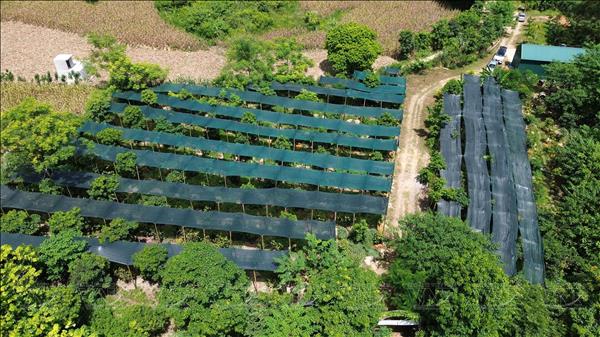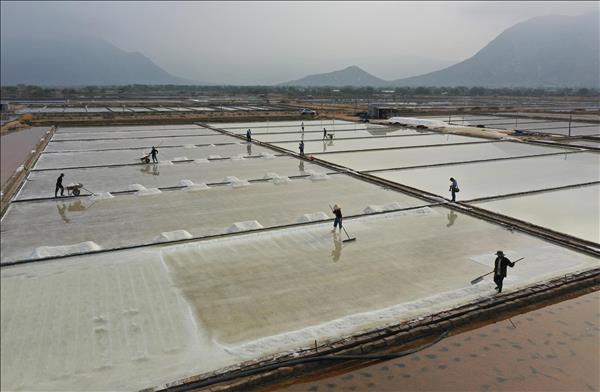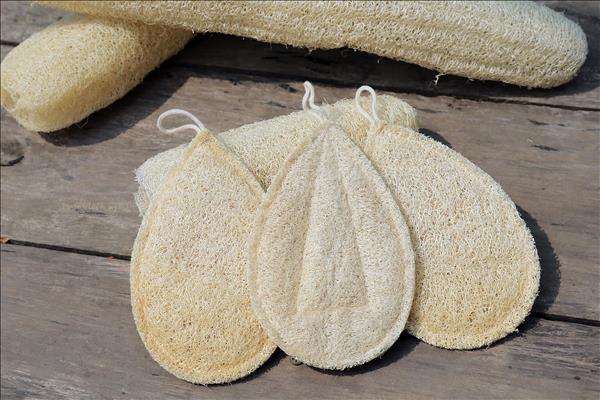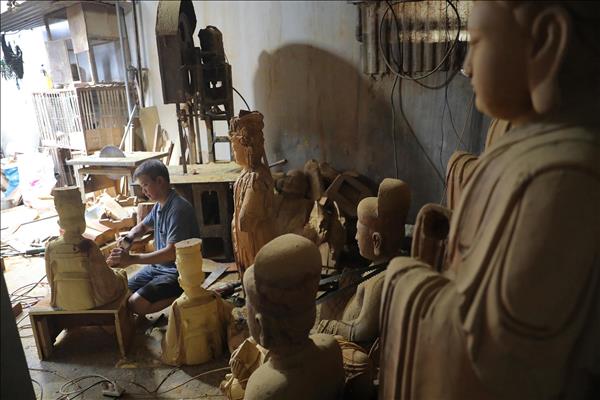The Shan Tuyet tea tree is one of the agricultural crops defined as the strength of Dien Bien Province. It is also considered “green gold” that brings about a better life to the Mong ethnic people in the harsh rock plateau in Tua Chua District.
From the legend of “green gold”...
Tua Chua is one of the most remote and needy mountain provinces in Dien Bien Province. Situated at an altitude of 1,400m, Tua Chua is considered the “heaven’s gate” of the western region in the North of Vietnam. The area has a special climate with four seasons in a day and soil that are very suitable for the development of the Shan Tuyet tea tree.
According to the elders in Tua Chua, since they were children, they saw ancient Shan Tuyen tea trees in front of their houses. Those tea trees, hundreds of years old, grow at the altitude of thousands of metres. They are about 8-10m high and its trunk has the diameter of two metres. During the winter, the tea trees on the high mountains are covered by frost and ice and they seem not to be able to survive in the ice-cold weather, yet when the spring comes, the tea trees sprout and bud, bringing the locals a bumper crop. These tea trees’ buds and young leaves are covered in a thin layer of snowy hair which creates the name “Tra Shan Tuyet”, or Snowy Shan tea.
It is easy to differentiate the Shan Tuyet tea and others because after being processed Shan Tuyet tea still has a thin layer of snow-white hair. That special feature brings a subtle drink which is believed to be good for health and help the locals feel stronger when living and working on rocky mountains.
At present there are nearly 4,000 ancient tea trees in Sin Chai which has the largest number of this variety in Tua Chua District. Ha Minh Hien, Deputy Chairman of Sin Chai Commune People’s Committee said that the Mong ethnic people call Shan Tuyet tea trees the “immortal trees” because in their mind, these ancient tea trees are the symbol of endurance and strong and immortal vitality.
…To the Shan Tuyet tea trademark
Shan Tuyet tea trees have now become one of the major agricultural crops with high economic value that help the Mong ethnic people in Tua Chua improve their living standards and develop the household economy.
We visited the family of Hang A Chu in Hau Chua Village who is a bright example in the household economy development from Shan Tuyet tea trees. When most of the villagers in Sin Chai were still backward in the method of harvesting and processing tea, the family of Chu started buying tea from others and selling the product to many factories. At present, his family owns a workshop of drying tea. Each crop, his family harvests over 300 kilograms of tea and collects from 700-800 kilograms of tea. With the market price of 200,000-300,000 VND per kilogram of Tua Chua tea, he earns hundreds of millions of dong/year.
Ha Minh Hien said that recognizing the high economic value of tea, Dien Bien Province has a project of developing this plant, particularly the Shan Tuyet tea trees, to become a strength for economic development in the province.
According to To Van Tuan, Deputy Head of Tua Chua District’s Agricultural Department, Dien Bien Province’s People Committee approved a project on zoning off the area for cultivating tea trees in four communes in the north of Tua Chua District, including Sin Chai, Ta Sin Thang, Ta Phinh and Sinh Phinh in the 2006-2015 period. With a total investment of over 84 billion dong, the district expects to have 600 hectares of this plant in 2015.
Being cultivated organically and harvested naturally, Shan Tuyet tea is not affected by chemicals so it is clean and safe and has superb characteristics which are a favourable condition for the locals to build the trademark of Tua Chua tea.
At present, each commune in the tea cultivating area has one factory to collect and directly process tea which is then transported to factories in the district for packing and selling to the market. Besides providing the locals with skills on tending and harvesting tea, Tua Chua District also support the locals with 3,000 VND for each kilogram of tea.
With great efforts and determination of the people and authority in Tua Chua, Shan Tuyet tea is expected to carve a firm niches in the market and help the locals become well-off in their native land.
Tua Chua is one of the most remote and needy mountain provinces in Dien Bien Province. Situated at an altitude of 1,400m, Tua Chua is considered the “heaven’s gate” of the western region in the North of Vietnam. The area has a special climate with four seasons in a day and soil that are very suitable for the development of the Shan Tuyet tea tree.
According to the elders in Tua Chua, since they were children, they saw ancient Shan Tuyen tea trees in front of their houses. Those tea trees, hundreds of years old, grow at the altitude of thousands of metres. They are about 8-10m high and its trunk has the diameter of two metres. During the winter, the tea trees on the high mountains are covered by frost and ice and they seem not to be able to survive in the ice-cold weather, yet when the spring comes, the tea trees sprout and bud, bringing the locals a bumper crop. These tea trees’ buds and young leaves are covered in a thin layer of snowy hair which creates the name “Tra Shan Tuyet”, or Snowy Shan tea.
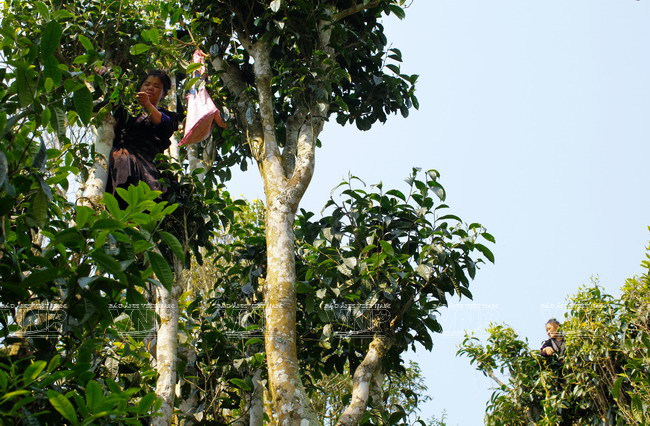 Sin Chai Commune has the largest number of ancient Shan Tuyet tea trees in Tua Chua District, Dien Bien Province.  During the harvest season, the Mong have to climb up the old tea trees to pick tender tea leaves and buds. 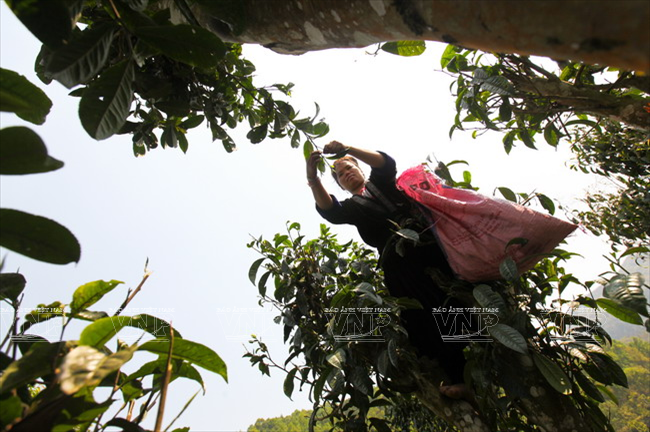 A Mong woman harvests Shan Tuyet tea. 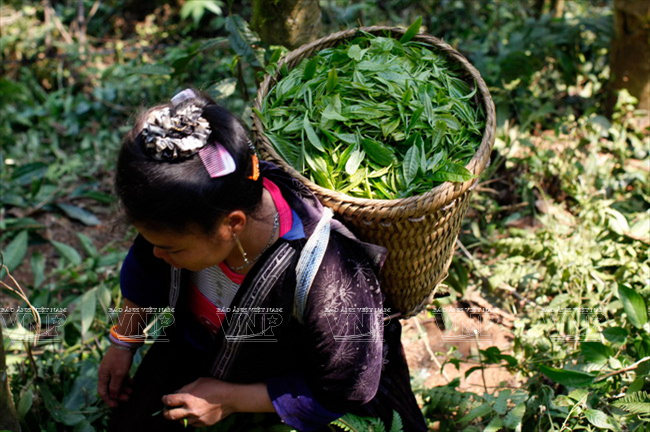 Using bamboo baskets to carry Shan Tuyet tea leaves. 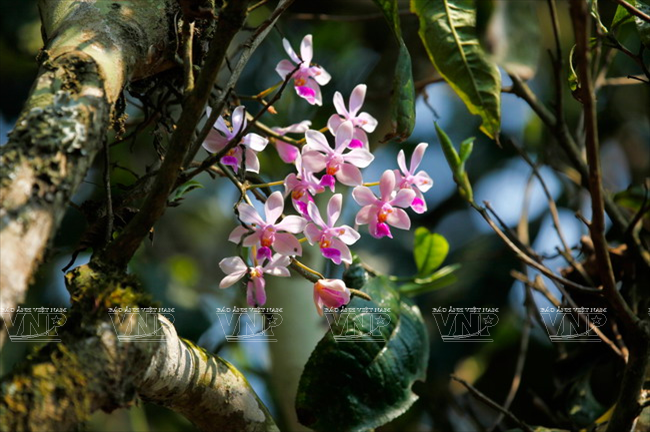 Cluster of orchid living on a Shan Tuyet tea tree. 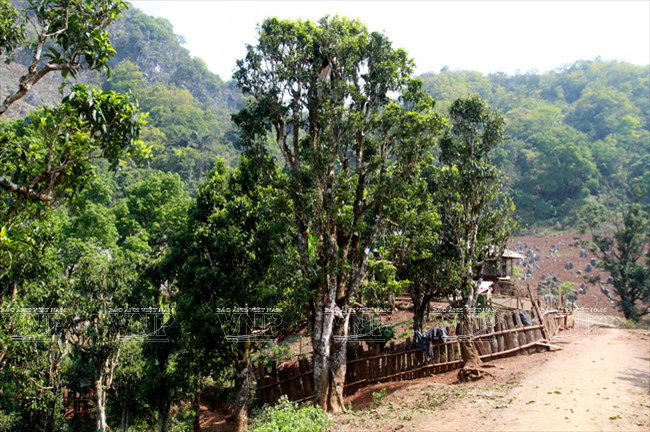 Sin Chai is located at an altitude of 1,400m and it has a special weather with four seasons in a day, which creates favourable conditions for the development of Shan Tuyet tea trees. |
| « Shan Tuyet tea in Tua Chua has a distinctive scent and delicious taste. When mixed with hot water, the tea drink has a yellow colour. It is quite bitter when just drinking, but it leaves a light sweet taste on the tongue after that. » |
At present there are nearly 4,000 ancient tea trees in Sin Chai which has the largest number of this variety in Tua Chua District. Ha Minh Hien, Deputy Chairman of Sin Chai Commune People’s Committee said that the Mong ethnic people call Shan Tuyet tea trees the “immortal trees” because in their mind, these ancient tea trees are the symbol of endurance and strong and immortal vitality.
…To the Shan Tuyet tea trademark
Shan Tuyet tea trees have now become one of the major agricultural crops with high economic value that help the Mong ethnic people in Tua Chua improve their living standards and develop the household economy.
We visited the family of Hang A Chu in Hau Chua Village who is a bright example in the household economy development from Shan Tuyet tea trees. When most of the villagers in Sin Chai were still backward in the method of harvesting and processing tea, the family of Chu started buying tea from others and selling the product to many factories. At present, his family owns a workshop of drying tea. Each crop, his family harvests over 300 kilograms of tea and collects from 700-800 kilograms of tea. With the market price of 200,000-300,000 VND per kilogram of Tua Chua tea, he earns hundreds of millions of dong/year.
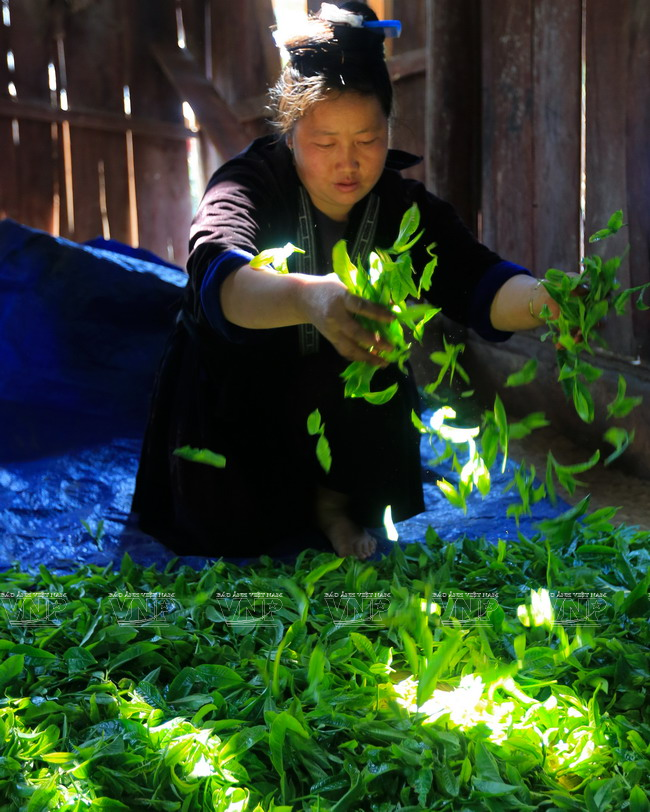 Pre-processing tender tea leaves by a Mong family in Sin Chai. 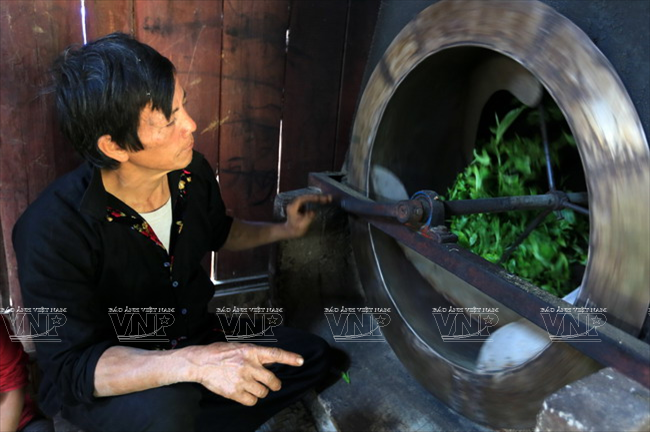 Hang A Chu, a bright example of developing a household economy from Shan Tuyet tea trees in Hau Chua Hamlet. 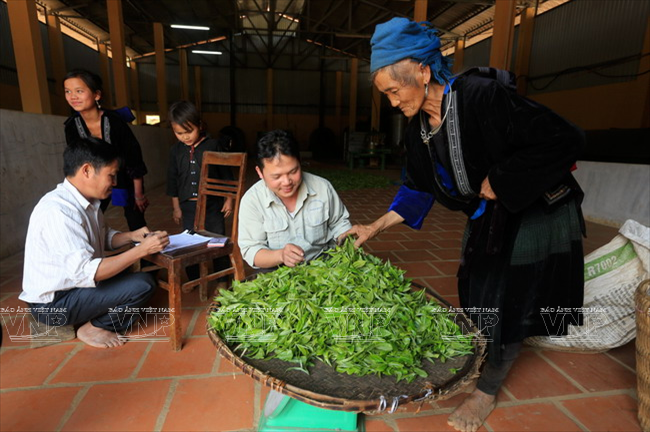 There are four factories to collect and process tea in the tea cultivating area in four communes in Tua Chua District. 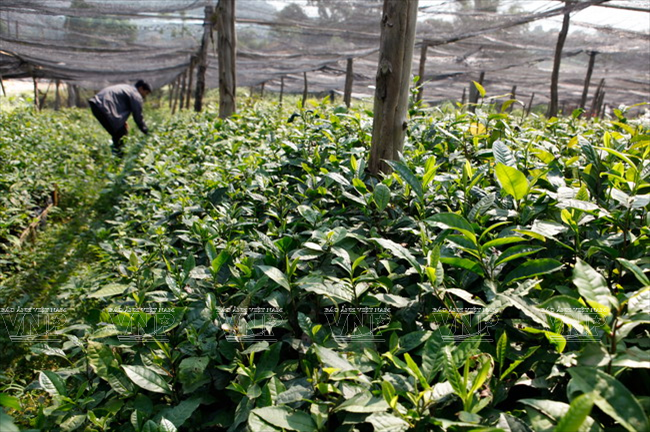 Tending the seedlings for the project on developing the tea cultivating area in four northern communes of the district. |
| «
With a total number of 10,000 Shan Tuyet tea trees which are hundreds of years old, Tua Chua is evaluated as the place having a larger density of ancient tea trees than other provinces nationwide. The Shan Tuyet tea trees grow naturally without fertilizers and insecticides so the tea is clean, safe and good for health.
» |
According to To Van Tuan, Deputy Head of Tua Chua District’s Agricultural Department, Dien Bien Province’s People Committee approved a project on zoning off the area for cultivating tea trees in four communes in the north of Tua Chua District, including Sin Chai, Ta Sin Thang, Ta Phinh and Sinh Phinh in the 2006-2015 period. With a total investment of over 84 billion dong, the district expects to have 600 hectares of this plant in 2015.
Being cultivated organically and harvested naturally, Shan Tuyet tea is not affected by chemicals so it is clean and safe and has superb characteristics which are a favourable condition for the locals to build the trademark of Tua Chua tea.
At present, each commune in the tea cultivating area has one factory to collect and directly process tea which is then transported to factories in the district for packing and selling to the market. Besides providing the locals with skills on tending and harvesting tea, Tua Chua District also support the locals with 3,000 VND for each kilogram of tea.
With great efforts and determination of the people and authority in Tua Chua, Shan Tuyet tea is expected to carve a firm niches in the market and help the locals become well-off in their native land.
Story: Vy Thao – Photos: Viet Cuong
danghuyen

